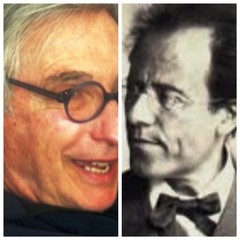|
Back
Life and Transfigurations New York
Isaac Stern Auditorium, Carnegie Hall
03/06/2019 - & January 17, 2019 (Vienna)
Gustav Mahler: Symphony No. 9
Vienna Philharmonic Orchestra, Michael Tilson Thomas (Conductor)

M. Tilson Thomas/G.Mahler (© Samuel A.Dog)
EMILY: “Do any human beings ever realize life while they live it? Every, every minute?”
STAGE MANAGER: “No”
EMILY: Oh, earth, you’re too wonderful for anybody to realize you.”
Thornton Wilder, from Our Town
The old banality that Mahler’s Ninth Symphony was the composer’s farewell to life is nonsense. Any open-eared listener knows that, Mahler knew that, and Michael Tilson Thomas certainly knows that.
Biographically, Mahler was in excellent health when he wrote, and he was planning a whole series of new works, as well as travels through America. Besides, while the first movement may be a confusion of inspiration, the two middle movements are joyful (granted, acerbic joy), and the finale, all in a major key, is a beatific, angelic hymn to beauty and to life itself. Yes, the final measure has the word ersterbend ("dying away") attached to it. But with the word pppp as the volume, a sforzando would be inane.
Mr. Thomas has been associated for the past decades with the San Francisco Orchestra, and his recordings of Mahler are stellar. But the Vienna Philharmonic, in its farewell performance in New York (not, hopefully its “dying away” performance) has been associated with Mahler’s Ninth for many decades. The combination of the two should be heaven-sent.
The performance last night was not as memorable as it might have been. Mr. Thomas conducted a slow, perhaps overly slow performance, around 84 minutes in total. This would still be acceptable. Leonard Bernstein, I believe, said that nobody could ever exaggerate Mahler too much. Yet Mr. Thomas didn’t exaggerate anything. It was, if anything, the worst kind of Mahler, in that it was not idiosyncratic.
Add to that, instrumental moments which defied the greatness of the Vienna Phil. Mainly in the manifold horn solos. Horns are more likely to flub than any other instrument, and are usually forgiven. But Mahler’s Ninth can be virtually a horn concerto at times, and the group, or perhaps the First Horn, failed at their tasks.
The few errors in that complicated first movements did not seem serious. But as the work went on, I flinched before each horn entrance, hoping, praying, that the sounds would come out without errors. That was not to be.
The third problem was the audience. Rossini once said that opera would be improved immensely “without all those singers.” Concerts might be improved without Carnegie Hall audiences for not sucking on the free Ricolas. For those first sighing measures of the Ninth are like the first seconds of successful procreation, the growth of the work dependent on those initial notes.
Thus, the barrage of coughing at the start was a mass coitus interruptus.
Not that it destroyed Mr. Thomas’ efforts to lead his orchestra through a movement of complexity, abrupt interruptions, grand climaxes and a musicality that might be more clear with a philosopher. What Mr. Thomas did offer was an uninterrupted pulse, a quantum movement of both waves and points together. It was a difficult but startling start.
Nor could one fault his waltz-theme second movement. The third is called “burlesque”, but it could be more appropriate here. Mr. Thomas is a dancing conductor, a joy to watch and a joy to hear as he swung through a series of country dances, disrupted by squeaks, or explosive wind sounds. The original parody of Mahler’s First Symphony funeral march was simplistic compared to this complex paean/parody.
For the third movement, I have only two words. Charles. Ives. Mr. Thomas is a fervent Ivesian, and this Ninth was written a year before Ives’ Fourth. Granted, Mahler was more acerbic, but both movements were happily hysterical quodlibets of tunes, harmonies, dissonances, craziness.
I would have been un-dumbfounded if he’d ended with a snatch of Columbia, the Gem of the Ocean.
Then came that long, lovely, not agonizing finale. Timed here at 33 minutes, but–except for the horns–never ever wearying. Mr. Thomas was steady, he brought these tender undulations to near-climaxes, then backed down again, since Mahler had oh so much more to say.
No, this was not a requiem for himself, though it was possibly a gentle lament for his dead daughter. It was also a movement for life. Mahler might have said it was a poem for beauty, for nature, for existence itself. Mr. Thomas conducted it with a matter-of-fact appreciation. Thus it was never lachrymose, and its “dying” last note was simply Mahler’s way to say that all was said. And that his life was content.
Harry Rolnick
|